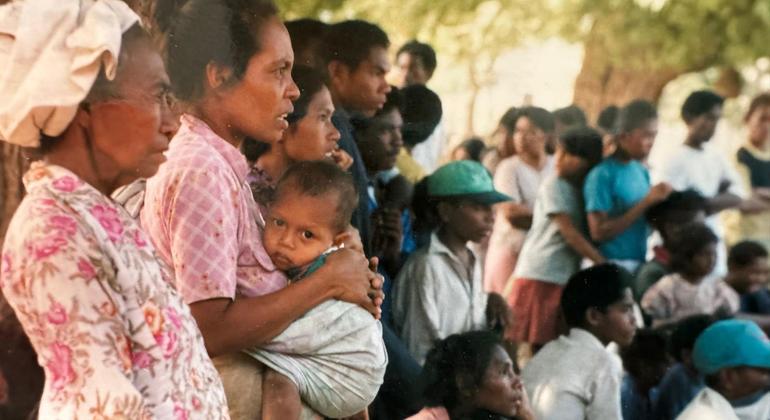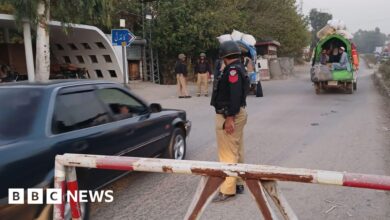In the fight for development, ‘you can count on us’, Guterres tells Timor-Leste, marking 25 years of self-determination

In a surprise move, lawmakers made the UN chief an honorary citizen of the Southeast Asian island nation during a ceremony in the capital Dili, prompting the UN chief to declare he was proud to now be part of such a “heroic nation”.
East Timor’s struggle to liberate the country from Portuguese rule and then violent Indonesian occupation in 1976 culminated in a United Nations-organized referendum on August 30, 1999.
The Indonesian government officially recognized the overwhelming vote for independence in October of that year, after weeks of deadly fighting and sabotage, after which a United Nations peacekeeping force oversaw the transition to full self-government—the birth of an independent Timor Leste.
Portuguese and Timorese
“I am very proud to assume the citizenship of a heroic people and I will do everything so that when I have completed my mandate, the people of Timor can be proud of what their citizens have been able to achieve,” Mr. Guterres told lawmakers.
The announcement was made by Parliament Speaker Maria Fernanda Lay, the first woman to preside over a legislature in Timor-Leste, during the anniversary of the 1999 vote, known locally as the “people’s consultation”.
MPs paid tribute to Mr Guterres’ role as former Portuguese prime minister in championing the cause of the Timorese people, saying he had called several world leaders at the time “asking them to use their influence to prevent a massacre in Timor-Leste”.
The United Nations Election Mission, UNAMET, was honored several times during the celebration and received a special mention from Mr. Guterres.
“The women and men of UNAMET showed great dedication and professionalism in organizing a large-scale referendum, in a short time and despite threats and intimidation. After the People’s Consultation, and as violence spread, they once again showed great courage and a sense of mission.”
The seeds of sovereignty are planted
The situation only stabilized in September 1999 with the dispatch of a multinational peacekeeping force approved by Security CouncilINTERFET. Guterres also recalled Other UN missions have contributed to peace. in Timor-Leste.
The UN leader praised the “tremendous courage and tireless determination of the Timorese people” and said that “the world can learn much from Timor-Leste”.

UN Secretary-General António Guterres addresses the Parliament of Timor-Leste.
Parliament leader Maria Fernanda Lay said the referendum vote reflected the weight of 24 years of struggle against Indonesian occupation and was aimed at “sowing the seeds of a free and sovereign nation”.
Referendum: A Lesson in Courage
The 1999 UN-sponsored referendum gave the Timorese people a historic opportunity to demonstrate their determination to gain autonomy – despite an environment of violence and intimidation.
Before dawn on August 30, thousands of East Timorese left their homes in the dark and set out on foot, determined to realize the ideals enshrined in Articles 1 and 55 of the Constitution. United Nations Charter: self-determination
The UN presence was crucial to the transition that ended Indonesia’s 24-year occupation, which began just days after the small island nation ceased to be a Portuguese colony.
The UN flag ‘inspires us’
In an exclusive interview with United Nations News This week, Felipe de Carvalho in the capital of Timor, resistance leader and current Prime Minister Xanana Gusmão said the independence movement has a military, political and diplomatic front.

A United Nations staff member assists voters as they cast their ballots at a chaotic polling station.
“The United Nations flag has inspired us with international law, the right to self-determination and independence of all people. It is a form of the United Nations presence in our fighting spirit.”
He described the referendum as “decisive for the fate of the country”.
Talk to United Nations NewsPresident José Ramos Horta said the fight against the Indonesian occupation was disproportionate and “militarily impossible”. The occupation caused more than 200,000 deaths – a staggering 25 percent of Timor’s population at the time – and included the use of US-supplied weapons, such as napalm, which had previously been used with devastating effect in the Vietnam War, President Horta said.
A diplomatic victory
For the president, who won the Nobel Peace Prize in 1996, East Timor’s victory was a lesson in diplomacy and good politics, involving on the one hand preserving cultural identity and on the other applying international pressure.
“So Timor is a success story, not least because the Security Council found consensus. There was consensus in the Security Council. Total consensus. But there was consensus because Indonesia accepted, because if Indonesia did not accept – and Indonesia is very important to a number of Security Council members – there would be no consensus at all.”
The referendum – known locally as the people’s consultation – played a key role in strengthening multilateral action for East Timor at the time, pressuring Indonesia to relinquish control.
According to the head of the UN electoral mission UNAMET, established in June 1999, the moment was special because rarely did the organization have such a clear opportunity to “give the people what they were looking for”.
Despite the presence of international journalists and 2,300 election observers, acts of public intimidation and attacks on UN offices “never stopped”, said Ian Martin. The violence was mainly carried out by pro-Indonesian militias supported by the occupying power’s armed forces.
For Mr Martin, the “courage and determination of the Timorese people” was felt during the registration process. At the time, many Timorese had been displaced and were living in hiding in the mountains, but turnout was still high and it was clear that the number of voters would exceed all expectations.
This, he said, was why the United Nations – after consulting with Timorese leaders such as Xanana Gusmão, who was then detained in Indonesia – decided to proceed, despite the security risks.
One of UNAMET’s greatest achievements was registering 433,576 people for the Timor-Leste referendum in just 22 days. Strategies included flexibility in registering undocumented people and those displaced outside their areas of origin, but above all, innovative communication methods.
Fear of being attacked
There were widespread fears of an armed attack on the day of the referendum. However, Nick Birnback, who worked in UNAMET’s communications team at the time, said that at the largest polling station there were “long queues of people waiting before sunrise, not wanting to miss out on the chance to vote”.
Overall, 98.6 percent of East Timorese registered to vote turned out, mostly in the early morning.
However, that same day, the first death of a UN staff member on the ground was reported, in a knife attack in the Ermera district. A UN helicopter carrying ballot boxes from one of the villages to the capital was targeted with gunfire. A few days later, a UN convoy was chased into Liquiça and hit by 15 bullets. By the end of the mission, 14 staff members were dead or missing.
Wave of violence
Amid escalating violence after the vote, on September 4, Ian Martin announced the results, read simultaneously by then-UN Secretary-General Kofi Annan in New York: 78.5 percent of the vote was in favor of rejecting the autonomy proposal—which called for separation from Indonesia—and 21.5 percent in favor. The path to independence was set.
The former UNAMET chief recalled experiencing mixed emotions. On the one hand, the privilege of being in the “joyous atmosphere” of witnessing the results celebrations, but on the other hand, the fear of being attacked at any time.
According to him, immediately after the announcement, “the militia surrounded the place and started burning the buildings” and as a result, he was taken by security forces to the UNAMET headquarters with only “the clothes on his back”.
Days later, the hotel where the referendum results were announced was looted and burned.
Martin recalled that the constant gunfire around UNAMET prompted many East Timorese to seek refuge under the UN flag and climb over walls lined with barbed wire. The head of the electoral delegation described a harrowing scene of “families throwing babies over the wall and UN teams holding them back on the other side”.

A billboard welcoming UN Secretary-General António Guterres to Timor-Leste.
The nun saved 800 people
Nearby, at the Canossian Mothers convent, the convent’s director, Sister Esmeralda, is sheltering about 800 refugees who began arriving in fear of violence in mid-August. She has encouraged people to vote, despite the risks.
After the results were announced, Esmeralda performed a great act of bravery. She single-handedly faced a large group of militiamen who had invaded the convent. The nun ordered everyone to lay down their weapons, lined up the 800 refugees, and led them to the UNAMET facility, passing through the militia lines.

The nun has helped mobilize health care and food for nearly 2,000 displaced people staying at the UN compound, which has been converted into a humanitarian camp. The site is protected by an Indonesian military fence, but there is no guarantee that actual militias will be kept out.
UNAMET is surrounded
At the time, according to Nick Birnback, keeping East Timor in the news was crucial to preventing a massacre, including of national and international UN staff. Using a spare satellite phone, the besieged gave interviews to media outlets around the world, and journalists still on the ground frantically filed copies to newsrooms.
With the risks mounting, Ian Martin had to initiate a process to evacuate UN staff. However, one of the most common messages during the referendum campaign was that UNAMET would stay, regardless of the outcome.
With no means of ensuring security, the presence of international teams was the only hope of preventing a massacre. At that moment, Sister Esmeralda spoke out again, saying that she would not accept that the Timorese people could be abandoned again.
Ambassador on the ground
A group of about 80 mission members volunteered to stay until a solution was found to ensure the evacuation of the entire refugee population there.
The resolution began to move closer after a crucial visit by members of the Security Council, who met in Jakarta. They arrived in Dili on September 11, accompanied by Indonesian military chief General Wiranto.
The delegation witnessed first-hand the plight of refugees inside the UNAMET complex and witnessed the devastation across the country – where more than 80 percent of buildings have been destroyed.
The following day, Indonesia announced that it would accept the deployment of a multinational force. With this decision, all personnel at the UNAMET headquarters were evacuated and the violence was contained.
The international force in East Timor, INTERFET, was approved by the Security Council on 15 September 1999 and began operations on 20 September.




